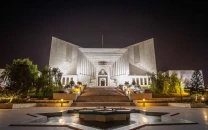Finance Bill 2017: Govt proposes delegating cabinet’s power to minister
If approved by parliament, finance minister and FBR will enjoy powers not even allowed to PM by the SC

Finance Minister Ishaq Dar. PHOTO: FILE
The government has proposed changes in the Sales Tax Act of 1990, the Customs Act 1969 and the Federal Excise Duty Act to empower the Federal Board of Revenue (FBR) to make changes in these laws with the approval of finance minister, according to the Finance Bill 2017 that Finance Minister Ishaq Dar tabled in parliament on Friday.
If the National Assembly approves these amendments, finance minister and the FBR will enjoy vast powers – something that the apex court had not even allowed prime minister to exercise.
Dar unveils Budget 2017-18 with Rs4.75 trillion outlay
After apex court’s judgment of August last year, the existing legal and regulatory procedures cannot be changed without the prior approval of the federal cabinet. In the light of the 18th amendment to the Constitution, the court defined ‘federal government’ as the federal cabinet including the prime minister.
Now, the federal government has to take every case to the federal cabinet for approval, although it is not strictly following the court verdict. The federal cabinet has already delegated its powers to issue supplementary budget to finance minister.
The apex court’s landmark judgment that stopped prime minister from unilaterally taking decisions on fiscal matters was aimed at restoring the constitutional structure of trichotomy of power that the government had severely compromised.
Rs1 trillion development budget unprecedented in history of Pakistan: PM
The Constitution assigns the Supreme Court the responsibility of ensuring harmony and balance among the three pillars of the state -- legislature, executive and judiciary. The federal government had filed a review petition against the Supreme Court’s verdict which the top court turned down.
“The 18th constitutional amendment that changed the definition of federal government was in hindsight a mistake and I have discussed this issue with parliamentarians to correct the situation,” said Dar while addressing post-budget press conference.
He said as a result of the 18th amendment, the country went from one extreme to another.
Health budget up by 80% in budget for fiscal year 2017-18
“Every week there is an issue related to taxation and we cannot take each case to the cabinet for its approval,” said Dar while defending the decision to seek delegation of taxation powers from the federal cabinet to the FBR with prior approval of finance minister. “The amendments have been proposed to resolve this issue and smoothly perform the government’s functions,” he added.
The government has proposed to amend section and sub-sections of Section 3 of the Sales Tax Act. If parliament approves these amendments, the FBR and finance minister will have vast powers to change scope of the sales tax, zero-rated sectors, determination of tax liabilities, tax credit and making special procedures.
Similar amendments have also been proposed in the Customs and Federal Excise Duty laws which will allow the FBR and finance minister to exempt people and sectors from levies.
Supreme Court’s non-development budget up 6%
Now the powers of the federal government to levy sales tax at varied rates as enunciated in sections of the Sales Tax Act, 1990 have been devolved to the FBR with the approval of minister in-charge i.e. finance minister, says commentary of the Finance Bill by Tola Associates, the tax and corporate advisory firm.
As a result of the apex court judgment, a protracted procedure is required to be followed if such notification is issued by the federal government. To short-circuit the lengthy process, this power is proposed to be delegated to the FBR but with the approval of finance minister, adds the commentary.
The government has also proposed giving legal cover to the notifications that the federal government has already issued from 2013 to 2017 as well as the future notifications that will be issued till June 2018.



















COMMENTS
Comments are moderated and generally will be posted if they are on-topic and not abusive.
For more information, please see our Comments FAQ